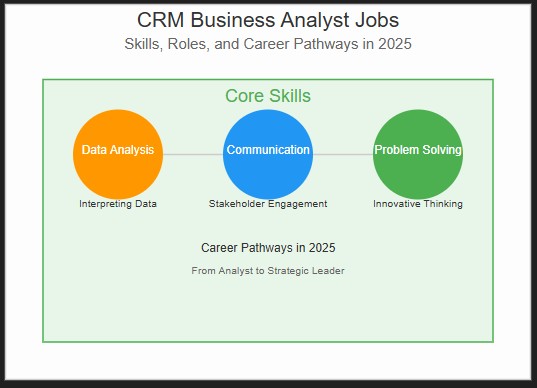In a world increasingly driven by customer data, CRM Business Analysts (CRM BAs) have emerged as key players in bridging the gap between customer expectations and business operations. As companies double down on delivering personalized, efficient, and omnichannel experiences, the role of CRM BAs has shifted from a supporting position to a strategic necessity.
Table of Contents
The Rise of CRM Business Analysts in a Customer-Centric Era
Whether in eCommerce, healthcare, fintech, or SaaS—companies are seeking CRM analysts who can translate data into insights, optimize processes, and unlock growth opportunities. With customer relationship management becoming a boardroom-level concern, CRM Business Analyst jobs are among the most in-demand tech-business hybrid roles in 2025.
This article dives deep into what CRM business analysts do, the skills they need, job responsibilities, real-world examples, tools, certifications, salary expectations, and how to kickstart or elevate a career in this field.
1. What Is a CRM Business Analyst?
A CRM Business Analyst is a professional who works at the intersection of business operations and CRM technology. They analyze customer data, gather requirements, and optimize CRM systems to improve customer journeys, marketing performance, sales processes, and support strategies.
Unlike general business analysts, CRM BAs specialize in platforms such as Salesforce, HubSpot, Zoho CRM, Microsoft Dynamics, and others. They work closely with stakeholders from sales, marketing, IT, and product teams to ensure the CRM system aligns with business goals and enhances the customer experience.
2. Why Companies Hire CRM Business Analysts
🔹 Data-Driven Decision Making: CRM BAs transform raw customer data into actionable insights.
🔹 Process Optimization: They identify bottlenecks in sales pipelines, lead funnels, and support flows.
🔹 CRM Platform Maximization: Ensure full utilization of expensive CRM tools.
🔹 Cross-Team Collaboration: Act as translators between non-technical stakeholders and developers.
🔹 Compliance & Data Integrity: Support GDPR, CCPA, and industry-specific regulations.
3. Key Responsibilities of a CRM Business Analyst
📌 Core Tasks Include:
-
Gathering and documenting business requirements for CRM implementations
-
Mapping and optimizing customer journeys
-
Performing gap analysis between business needs and CRM system capabilities
-
Creating dashboards and reports for decision-makers
-
Collaborating with developers to customize CRM functionalities
-
Conducting UAT (User Acceptance Testing)
-
Ensuring data cleanliness and consistency across systems
-
Supporting CRM training and user onboarding
4. Required Skills for CRM Business Analyst Jobs
💼 Hard Skills:
| Skill | Description |
|---|---|
| CRM Platforms | Deep expertise in tools like Salesforce, Dynamics 365, HubSpot, Zoho |
| SQL | For querying customer databases |
| Data Visualization | Tools like Tableau, Power BI |
| Excel/Sheets | Pivot tables, formulas, macros |
| Agile/Scrum | Familiarity with project management frameworks |
| APIs & Integration Knowledge | Basics of REST APIs, data syncs |
💡 Soft Skills:
-
Analytical thinking
-
Problem-solving
-
Communication & stakeholder management
-
Documentation skills
-
Business acumen
5. Common Tools Used by CRM Business Analysts
Here’s the CRM BA toolkit most professionals work with:
CRM Business Analyst Tool Stack:
├── CRM Platforms (Salesforce, HubSpot, Dynamics 365)
├── BI Tools (Tableau, Looker, Power BI)
├── Data Handling (SQL, Excel, Google Sheets)
├── Project Management (JIRA, Trello, Monday.com)
├── Collaboration (Slack, Zoom, Confluence)
├── API Testing (Postman, Insomnia)
├── ETL/Integration (Zapier, Workato, MuleSoft)
6. Career Path and Growth Opportunities
CRM Business Analyst jobs can evolve into high-impact roles with time and upskilling:
| Level | Title | Description |
|---|---|---|
| Entry | Junior CRM Analyst | Assists in data analysis, reporting, and basic requirement gathering |
| Mid | CRM Business Analyst | Leads CRM projects, manages integrations, and communicates with stakeholders |
| Senior | Senior CRM BA / CRM Consultant | Defines CRM strategy, manages large-scale transformations |
| Expert | CRM Product Owner / CRM Architect | Owns roadmap, designs CRM architecture and oversees teams |
7. Educational Background and Certifications
🎓 Educational Paths:
-
Bachelor’s degree in Business, IT, Data Science, or Marketing
-
MBA or specialized master’s in Business Analytics (advantageous)
✅ Popular Certifications:
-
Salesforce Certified Business Analyst
-
HubSpot CRM Certification
-
Microsoft Power Platform Fundamentals
-
Certified Business Analysis Professional (CBAP)
-
Google Data Analytics Professional Certificate
8. Salary Expectations in 2025
CRM Business Analyst salaries vary by region, experience, and platform specialization.
| Region | Entry-Level | Mid-Level | Senior |
|---|---|---|---|
| USA | $65K – $85K | $85K – $120K | $120K – $160K |
| UK | £35K – £50K | £50K – £75K | £75K – £100K |
| India | ₹5L – ₹9L | ₹10L – ₹18L | ₹18L – ₹30L |
| Remote/Contract | $50/hr – $100/hr |
💡 Salesforce and Dynamics CRM analysts command premium rates.
9. Where to Find CRM Business Analyst Jobs
📌 Top Job Boards:
-
LinkedIn Jobs
-
Indeed
-
Glassdoor
-
AngelList (startups)
-
Dice (tech-focused)
-
RemoteOK (freelance/remote gigs)
📌 Top Employers Hiring in 2025:
-
Google Cloud
-
Amazon AWS
-
HubSpot
-
Accenture
-
Deloitte
-
IBM
-
Fintech startups and SaaS scale-ups
10. Sample CRM Business Analyst Job Description
Position: CRM Business Analyst
Location: Remote (Preferred EST timezone)
Platform: Salesforce
Experience Required: 3–5 years
Responsibilities:
-
Analyze customer journeys and suggest improvements
-
Define CRM workflows and custom fields
-
Collaborate with developers to implement CRM enhancements
-
Build weekly dashboards and insights
-
Ensure data integrity across touchpoints
Requirements:
-
Proficient in Salesforce CRM
-
Strong SQL and Excel knowledge
-
Experience in Agile projects
-
Excellent communication and documentation skills
11. Tips to Land a CRM Business Analyst Job
✅ Create a CRM-focused portfolio: Include dashboards, sample workflows, or business requirement documents.
✅ Learn at least one CRM platform deeply: Start with Salesforce or HubSpot.
✅ Master storytelling with data: Visualizations + insights = compelling analysis.
✅ Network with CRM professionals: Join LinkedIn groups, Slack communities, and attend webinars.
✅ Get certified: Stand out with platform-specific certifications.
12. The Future of CRM Business Analyst Roles
The demand for CRM BAs is expected to rise dramatically as AI, predictive analytics, and automation become embedded into CRM platforms.
🔮 Future Trends:
-
AI-driven recommendations: Analysts will interpret AI-suggested actions.
-
No-code CRM configurations: Analysts will become builders using drag-and-drop tools.
-
Embedded analytics: CRM BAs will drive embedded BI strategies.
-
Cross-system integration: Analysts will bridge CRM with ERP, HRIS, and finance systems.
Conclusion: Why CRM Business Analyst Jobs Matter More Than Ever
CRM Business Analyst jobs represent one of the most strategic, impactful, and future-proof career paths in today’s digital economy. These professionals are not only the voice of the customer within an organization but also the architects of scalable customer success frameworks.
As companies double down on personalization, data, and automation, CRM BAs will sit at the core of digital transformation initiatives. Whether you’re entering the field or leveling up, there has never been a better time to invest in this career.
The CRM revolution is here. Are you ready to analyze, optimize, and lead it?




